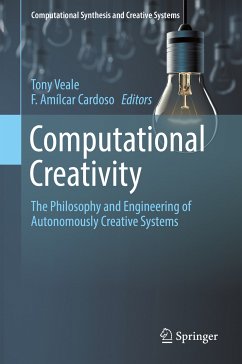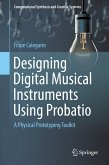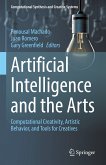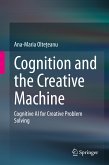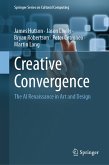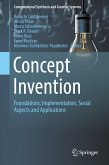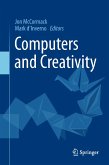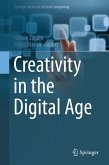Computational Creativity (eBook, PDF)
The Philosophy and Engineering of Autonomously Creative Systems
Redaktion: Veale, Tony; Cardoso, F. Amílcar
128,95 €
128,95 €
inkl. MwSt.
Sofort per Download lieferbar

64 °P sammeln
128,95 €
Als Download kaufen

128,95 €
inkl. MwSt.
Sofort per Download lieferbar

64 °P sammeln
Jetzt verschenken
Alle Infos zum eBook verschenken
128,95 €
inkl. MwSt.
Sofort per Download lieferbar
Alle Infos zum eBook verschenken

64 °P sammeln
Computational Creativity (eBook, PDF)
The Philosophy and Engineering of Autonomously Creative Systems
Redaktion: Veale, Tony; Cardoso, F. Amílcar
- Format: PDF
- Merkliste
- Auf die Merkliste
- Bewerten Bewerten
- Teilen
- Produkt teilen
- Produkterinnerung
- Produkterinnerung

Bitte loggen Sie sich zunächst in Ihr Kundenkonto ein oder registrieren Sie sich bei
bücher.de, um das eBook-Abo tolino select nutzen zu können.
Hier können Sie sich einloggen
Hier können Sie sich einloggen
Sie sind bereits eingeloggt. Klicken Sie auf 2. tolino select Abo, um fortzufahren.

Bitte loggen Sie sich zunächst in Ihr Kundenkonto ein oder registrieren Sie sich bei bücher.de, um das eBook-Abo tolino select nutzen zu können.
- Geräte: PC
- ohne Kopierschutz
- eBook Hilfe
- Größe: 26.33MB
Andere Kunden interessierten sich auch für
![Designing Digital Musical Instruments Using Probatio (eBook, PDF) Designing Digital Musical Instruments Using Probatio (eBook, PDF)]() Filipe CalegarioDesigning Digital Musical Instruments Using Probatio (eBook, PDF)72,95 €
Filipe CalegarioDesigning Digital Musical Instruments Using Probatio (eBook, PDF)72,95 €![Artificial Intelligence and the Arts (eBook, PDF) Artificial Intelligence and the Arts (eBook, PDF)]() Artificial Intelligence and the Arts (eBook, PDF)136,95 €
Artificial Intelligence and the Arts (eBook, PDF)136,95 €![Cognition and the Creative Machine (eBook, PDF) Cognition and the Creative Machine (eBook, PDF)]() Ana-Maria Olte¿eanuCognition and the Creative Machine (eBook, PDF)128,95 €
Ana-Maria Olte¿eanuCognition and the Creative Machine (eBook, PDF)128,95 €![Creative Convergence (eBook, PDF) Creative Convergence (eBook, PDF)]() James HutsonCreative Convergence (eBook, PDF)112,95 €
James HutsonCreative Convergence (eBook, PDF)112,95 €![Concept Invention (eBook, PDF) Concept Invention (eBook, PDF)]() Concept Invention (eBook, PDF)72,95 €
Concept Invention (eBook, PDF)72,95 €![Computers and Creativity (eBook, PDF) Computers and Creativity (eBook, PDF)]() Computers and Creativity (eBook, PDF)72,95 €
Computers and Creativity (eBook, PDF)72,95 €![Creativity in the Digital Age (eBook, PDF) Creativity in the Digital Age (eBook, PDF)]() Creativity in the Digital Age (eBook, PDF)40,95 €
Creativity in the Digital Age (eBook, PDF)40,95 €-
-
-
Produktdetails
- Verlag: Springer International Publishing
- Seitenzahl: 398
- Erscheinungstermin: 25. Juli 2019
- Englisch
- ISBN-13: 9783319436104
- Artikelnr.: 57626301
Dieser Download kann aus rechtlichen Gründen nur mit Rechnungsadresse in A, B, BG, CY, CZ, D, DK, EW, E, FIN, F, GR, HR, H, IRL, I, LT, L, LR, M, NL, PL, P, R, S, SLO, SK ausgeliefert werden.
- Herstellerkennzeichnung Die Herstellerinformationen sind derzeit nicht verfügbar.
Tony Veale received his Ph.D. in Computer Science on the subject of Creative Language Processing from Trinity College Dublin. Since then he has divided his career between academia and industry. He developed text-understanding and machine translation systems for Hitachi; he patented Web-based question-answering technology for Intelliseek and Coreintellect, where he held the position of Chief Scientist; during his tenure on the CYC project in Cycorp he developed a model of analogical reasoning and contributed to DARPA's High-Performance-Knowledge-Bases (HPKB) and Rapid-Knowledge-Formation (RKF) projects. He has coauthored over 120 research papers. He wrote the monograph Exploding the Creativity Myth: The Computational Foundations of Linguistic Creativity published by Bloomsbury Academic; he coedited the multidisciplinary volume Creativity and the Agile Mind published by Mouton De Gruyter; he coauthored the book Twitterbots: Making Machines That Make Meaning published by MIT Press;and he coauthored the book The Metaphor: A Computational Perspective published by Morgan Claypool. He has been an invited lecturer and has conducted tutorials and code camps related to creativity, both linguistic and computational, at international summer and autumn schools and conferences. He publishes widely in the area of Computational Creativity, further details are available at http://afflatus.ucd.ie F. Amílcar Cardoso received his Ph.D. in Engineering Sciences and his habilitation in Informatics Engineering, both from the University of Coimbra, where he is a full professor and teaches Artificial Intelligence, Cognitive Modeling, Computational Creativity, Sound Design, and Computer Programming for Design. He did pioneering work on Computational Creativity in the 1990s as leader of the team that authored several creative systems (e.g., SICOM, NEvAr, MuzaCazUza), and he has since assumed an active role in the area, as cofounder of the series of Creative Systems Workshops in 2001-2006, of the Intl. Joint Workshop on Computational Creativity (2007-2008), of the Intl. Conf. on Computational Creativity in 2010, and of the Association for Computational Creativity in 2017. He has been involved in two EU projects on Computational Creativity: PROSECCO (Promoting the Scientific Exploration of Computational Creativity) and ConCreTe (Concept Creation Technology). He was the General Chair of the 7th Intl. Conf. on Computational Creativity, held in Paris, France, June 2016. In recent years, his research has mainly focused on computational models of Conceptual Blending. His current interests also include bioinspired approaches to visual and auditory expression, data sonification, and interactive environments for sound and image.
Systematizing Creativity: A Computational View.- A Framework for Description, Analysis and Comparison of Creative Systems.- Autonomous Intentionality in Computationally Creative Systems.- From Conceptual Mash-ups to Badass Blends: A Robust Computational Model of Conceptual Blending.- The Nuts and Bolts of Conceptual Blending: Multidomain Concept Creation with Divago.- Bisociative Knowledge Discovery for Cross-domain Literature Mining.- Computational Design, Analogy, and Creativity.- The Evaluation of Creative Systems.- Expectation-Based Models of Novelty for Evaluating Computational Creativity.- Evaluating Evaluation: Assessing Progress and Practices in Computational Creativity Research.- Computer-Supported Human Creativity and Human-Supported Computer Creativity in Language.- Representing Social Common-Sense Knowledge in MEXICA.- Exploring Quantitative Evaluations of the Creativity of Automatic Poets.- Multi-agent-Based Models of Social Creativity.- Creative Systems: A BiologicalPerspective.- Breaking the Mould: An Evolutionary Quest for Innovation Through Style Change
Systematizing Creativity: A Computational View.- A Framework for Description, Analysis and Comparison of Creative Systems.- Autonomous Intentionality in Computationally Creative Systems.- From Conceptual Mash-ups to Badass Blends: A Robust Computational Model of Conceptual Blending.- The Nuts and Bolts of Conceptual Blending: Multidomain Concept Creation with Divago.- Bisociative Knowledge Discovery for Cross-domain Literature Mining.- Computational Design, Analogy, and Creativity.- The Evaluation of Creative Systems.- Expectation-Based Models of Novelty for Evaluating Computational Creativity.- Evaluating Evaluation: Assessing Progress and Practices in Computational Creativity Research.- Computer-Supported Human Creativity and Human-Supported Computer Creativity in Language.- Representing Social Common-Sense Knowledge in MEXICA.- Exploring Quantitative Evaluations of the Creativity of Automatic Poets.- Multi-agent-Based Models of Social Creativity.- Creative Systems: A BiologicalPerspective.- Breaking the Mould: An Evolutionary Quest for Innovation Through Style Change
